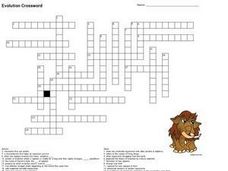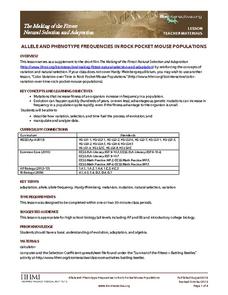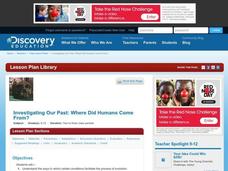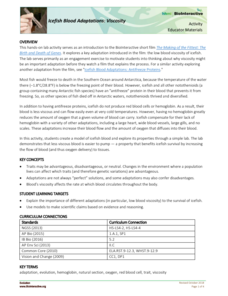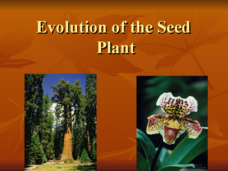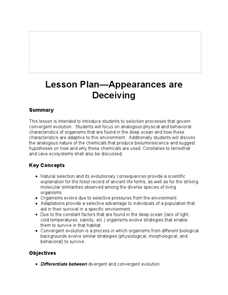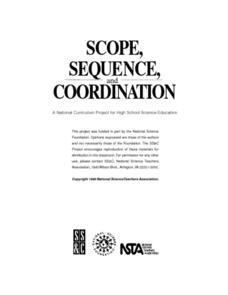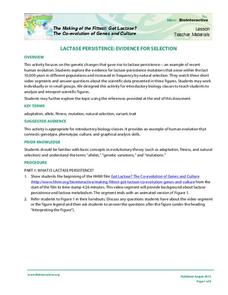Curated OER
Evolution Crossword
In this evolution crossword worksheet, 7th graders complete a crossword puzzle about evolution. Students read the definitions to fill in the puzzle with evolution terms.
Curated OER
Symbiosis and Co-evolution
By choosing a species and researching an adaptive symbiotic relationship it shares with another species, your students are able to investigate a symbiotic relationship in a lab setting. They create a presentation using a variety of...
Curated OER
Prairie Adaptations
Twelfth graders consider the survival of prairie plants. They examine how some tallgrass prairie species are adapted to the conditions of their ecosystem. They make a prediction of how a species might change given new conditions.
ARKive
Adaptations for Movement
What animals are best suited for moving around a rainforest, or a desert? Design your own animal species based on a particular habitat, focusing on the characteristics it will need for optimal movement. Great as a group lesson or...
Curated OER
Questions - Appearances are Deceiving
Five evolution-related questions are answered by beginning biologists on a separate sheet of paper. First, they are asked to list adaptations that allow organisms to survive under various conditions. The second question refers to...
Curated OER
Allele and Phenotype Frequencies in Rock Pocket Mouse Populations
In the deserts of Arizona and New Mexico, some tiny creatures show just how quickly natural selection can turn a mutation into an advantageous adaptation. Watch a video about rock pocket mice, who show that one small change can make all...
Curated OER
Investigating Our Past: Where Did Humans Come From?
Investigate the theories of human evolution. In this research based lesson, learners research and discuss how geographic isolation, interbreeding, generalization, and specialization are factors in the history of humans. Groups work...
Curated OER
Leaves: All-Natural Solar Collectors
Take a good look at tree leaves and notice the adaptations for collecting solar energy. Pupils trace the margins of five different leaves onto graph paper and count the number of squares covered. They then relate this infomation to the...
Howard Hughes Medical Institute
Icefish Blood Adaptations: Viscosity
Most fish freeze to death when the water is too cold, yet some fish live in the Southern Ocean where the water is often below freezing. Scholars use two models representing the blood from most fish versus the blood from Antarctic fish....
Curated OER
Evolution of the Seed Plant
Adaptations of the plant to develop gametes best suited to different pollination atyles are detailed, The conditions needed by Sporophytes and gametophytes of different sizes are detailed, along with the development of the seed after...
Howard Hughes Medical Institute
Using DNA to Explore Lizard Phylogeny
In a fun and interactive two-day lesson, learners sort anole lizard pictures by appearance. Next, they watch a video about the anoles and re-sort based on the information in the video. In addition to physical characteristics, budding...
California Academy of Science
Color Vision Genetics Evolution Simulation
At one point, all mammals carried only two color receptors, but now most humans carry three. An informative presentation and hands-on activity demonstrate how this evolved through genetics. By participating in the activity, pupils...
Howard Hughes Medical Institute
The Making of the Fittest: Evolving Switches, Evolving Bodies
How did the stickleback fish, which was once ocean bound, evolve to be able to persist in freshwater lakes? Hear from the scientists who identified the genes and related switches that allowed these survivors to adapt. In addition to the...
Curated OER
Lesson Plan - Appearances are Deceiving
Herre is a lesson on divergent and convergent evolution. It has links to terrific video clips, an associate worksheet, and more. The analysis questions have been reviewed separately on Lesson Planet if you would like more information....
Curated OER
AP: Chapter 29 and 30: Plant Diversity
It's a jungle out there! That is because of the tremendous diversity among plants. In this AP biology assignment, botanists answer questions about plant evolution, diversity, and reproduction. They differentiate between monocots and...
Curated OER
Variations in Living Things
Biology beginners observe traits in a collection of plant parts to realize the tremendous amount of genetic variation within a species. They consider rules of nature and discuss what would happen if they changed. They also examine data...
Curated OER
The Great Jellybean Hunt
Students model natural selection by acting as predators of jellybeans. In this evolution lesson plan, students use plastic utensils to pick up jellybeans. They use different colors of backgrounds to demonstrate the effects of camouflage...
Curated OER
How Evolution Works
Students examine the term natural selection and what behavioral adaptations are. In this evolution lesson students view videos about evolution and perform experiments that simulate populations that interplay between the forces of...
Curated OER
Ecology and Evolution
Students identify the different taxonomic classifications of organisms. In this biology lesson, students create their own organisms and make some changes according to environmental conditions. They present their work in class.
Curated OER
Charles Darwin
Students produce a newspaper describing the times during which Charles Darwin introduced the theory of natural selection. In this evolution activity, students make observations and explore the role of observation in Charles Darwin's...
Curated OER
Primate Evolution
For this primate evolution worksheet, students will compare 3 characteristics that all primates share. Then students will compare the traits of current primates to early man by completing 5 short answer questions.
Howard Hughes Medical Institute
Lactase Persistence: Evidence for Selection
What's the link between lactase persistence and dairy farming? Biology scholars analyze data to find evidence of the connection, then relate this to human adaptation. Working individually and in small groups, learners view short video...
Howard Hughes Medical Institute
Lactose Intolerance: Fact or Fiction
Around the world, about 2/3 of adult humans are lactose intolerant. Scholars work in small groups to discuss a few statements about lactose intolerance. Then, they watch a video on the topic and readdress each statement. Whole-class...
PEGAMES.org
RPS evolution
Stuck inside on a rainy day for PE? Try a fun game that will get your little learners moving around inside during wet weather. The game involves moving like various animals and peer interaction through games of rock-paper-scissors.


